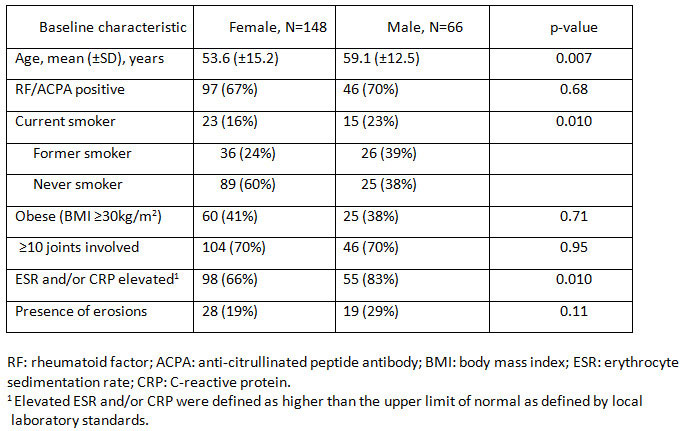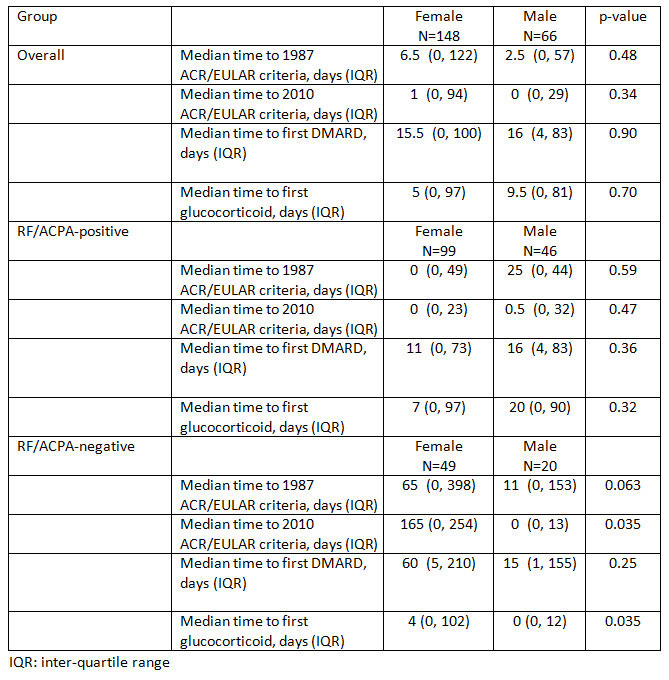Session Information
Session Type: Poster Session (Monday)
Session Time: 9:00AM-11:00AM
Background/Purpose: Rheumatoid arthritis differs between genders with regard to comorbidities, extra-articular manifestations, core measures of disease activity, and treatment response. Gender has not previously been associated with diagnostic delay in early RA, and the impact of gender on time to meeting ACR/EULAR classification criteria for RA is unknown. This study aimed to compare the time to fulfillment of 1987 and 2010 ACR/EULAR classification criteria between female and male patients with rheumatoid arthritis (RA), and to assess the potential impact of gender on the time to DMARD therapy.
Methods: Time from first provider-documented joint swelling to fulfillment of 1987 and 2010 ACR/EULAR criteria was measured in a population-based cohort of adults with incident RA in 2009-2014, who were stratified by male or female gender. Disease characteristics, time to start of DMARD therapy, and choice of initial DMARD therapy were compared between groups using Chi-square and rank sum tests.
Results: This study included 214 patients with RA (148 females and 66 males). Median times from first joint swelling to fulfillment of 1987 (6.5 vs 2.5 days, p=0.48) and 2010 (1 vs 0 days, p=0.34) classification criteria were not different between female and male patients. There was no difference in time from first joint swelling to first DMARD therapy in female vs male patients (15.5 vs 16 days, p=0.90), and methotrexate was used most frequently as first DMARD in both genders (61% female vs 64% male, p=0.76). Inflammatory markers were more commonly abnormal in male vs female patients at time of meeting 2010 criteria (83% vs 66%, p=0.010).
Among the 49 female and 20 male RF/ACPA-negative patients, females experienced a higher median time from first joint swelling to fulfillment of the 1987 (65 vs 11 days, p=0.063) and 2010 (65 vs 0 days, p=0.035) classification criteria. Similar proportions of females and males had >10 joints involved at the time they met 2010 criteria (82% vs 85%, p=0.74), but the time from first joint swelling to >10 joints involved was significantly longer for females than males (median 65 vs 0, p=0.038). Seronegative females were also more likely to be anti-nuclear antibody (ANA) positive than their male counterparts (30% vs 11%), but this difference did not reach statistical significance (p=0.11).
Conclusion: Overall there was no delay in meeting 1987 and 2010 ACR/EULAR classification criteria between female and male RA patients. However, among seronegative patients, females experienced a significant delay to meeting 2010 criteria from first clinically detected synovitis. This delay may be related to difficulty distinguishing RA from other diseases among seronegative females, or a delay in seeking healthcare among seronegative males.
To cite this abstract in AMA style:
Coffey C, Davis J, Crowson C. The Impact of Gender on Time to Rheumatoid Arthritis Classification [abstract]. Arthritis Rheumatol. 2019; 71 (suppl 10). https://acrabstracts.org/abstract/the-impact-of-gender-on-time-to-rheumatoid-arthritis-classification/. Accessed .« Back to 2019 ACR/ARP Annual Meeting
ACR Meeting Abstracts - https://acrabstracts.org/abstract/the-impact-of-gender-on-time-to-rheumatoid-arthritis-classification/


